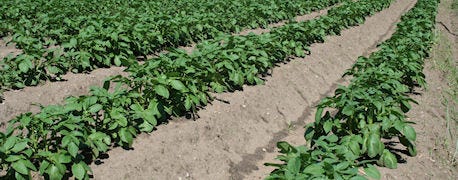July 25, 2013

By Ken Schroeder
Wisconsin is one of the top states in the nation in both dairy and vegetable production. In central Wisconsin, the heart of Wisconsin vegetable production, dairying is being integrated into the farming system. One might ask, "Why is this happening after all these years of specialized agricultural production?"

Incorporating high-organic matter from dairy manure into the sandy soils of central Wisconsin promises long-term rewards for vegetable crops like potatoes.
Combining vegetable production with dairy is a win-win situation when we consider the following benefits. Dairies have excess nutrient rich manure and are in need of land to spread that manure and land to grow grain and forages to feed their livestock. Vegetable growers are in need of large amounts of plant nutrients to produce their vegetables and would benefit greatly from longer rotation times between vegetable crops.
Mutually beneficial partnership
An excellent example can be seen in the Central Sands premier vegetable production area where Wysocki Produce Farms — a multi-generational family farm growing vegetables on the sands from Nekoosa to Bancroft — have joined forces with Central Sands Dairy — a leading dairy producer that provides milk to the cheese plant at Foremost Dairies.
This exciting venture was started by the Wysocki Family more than 10 years ago and based on a vision that the two seemingly very different production systems could be melded together to form a single, highly productive and yet more sustainable way of farming. The dairy and the vegetables systems each bring opportunities to the table that can be blended to generate synergies that make integrated farming systems sustainability a reality.
As mentioned above, dairy manure brings nutrients to the party. The essential plant nutrient, nitrogen, once a relatively minor cost, has grown exponentially more expensive over the past decade. Nitrogen from the manure provides most of the nitrogen for the vegetables grown helping in economic stability for the farm and offers consumers more affordable vegetables.
Adding corn, corn silage and alfalfa to the vegetable crop rotation has improved weed control by adding new alternatives to the farmer's toolbox to manage weeds that are difficult to control in vegetables. Alfalfa has the added advantages of being a deep-rooted, perennial crop that fixes its own nitrogen: the deep roots break up soil compaction naturally and reduce the need for energy- intensive deep cultivation. The increases in biodiversity that come with a long-term crop like alfalfa are already being seen in higher bee and pollinator populations; and the ability to fix its own nitrogen further reduces the need to add more artificial nutrients to the system.
There are other examples of how these two enterprises can work in tandem — incorporating the high-organic matter digested manure solids into the sandy soils of Central Wisconsin, promises even greater long-term rewards. Although still being evaluated, the enrichment of soil biodiversity is bringing observable increases in ecosystem services such as greater water holding capacity, improved resistance to wind erosion and loamier soil structure that has consistently increased vegetable yields.
Bringing vegetable and dairy systems together holds great promise for increased sustainability; as Jeff Sommers, farm manager for Central Sands Dairy says: "Closing the loop has created a whole bunch of synergies that we haven't even measured yet."
Visit the Wisconsin Institute for Sustainable Agriculture website for more information on efforts to improve agricultural sustainability. For more information on the concept of nutrient cycles and nutrient budgets see the publication, Nutrient Management for Fruit and Vegetable Crop Production: Nutrient Cycling and Maintaining Soil Fertility by Bierman and Rosen, Department of Soil, Water, and Climate, University of Minnesota 2005.
Schroeder is the Portage County Extension agriculture agent.
You May Also Like




